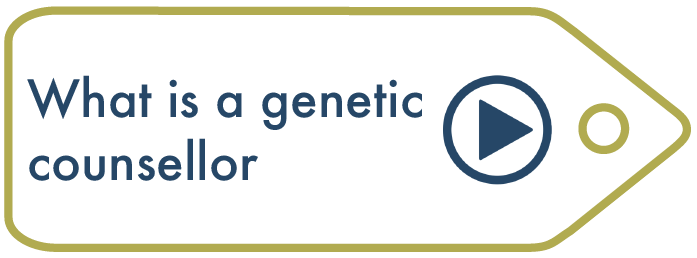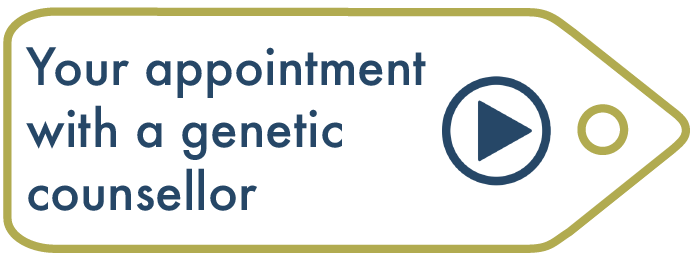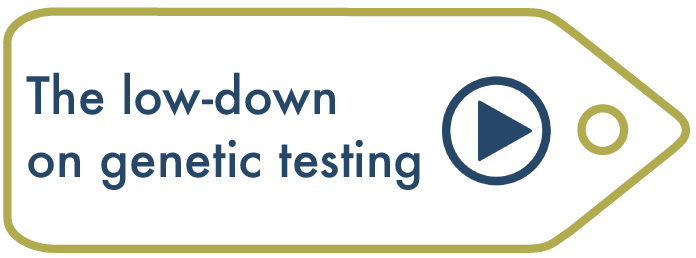How can genetic counsellor help you?
If cancer runs in your family, how do you know whether it will be a problem for you or you children? Should you get tested and what tests are recommended? Talking to a family cancer genetic counsellor can answer a lot of confusing questions and help you decide what to do next.
What is a genetic counsellor?
In New Zealand, the role of a genetic counsellor is often misunderstood. The word ‘counsellor’ suggests a therapeutic role, like a psychotherapist, but the reality is quite different.
Genetic counsellors are health professionals who have specific post-graduate qualifications in human genetics and counselling. They’re trained to help people who have, or suspect they have, a family history of cancer or another inherited disease.
At a counselling session, which we prefer to call a ‘consult’, you’ll talk to a genetic cancer specialist about your concerns. This conversation will help you to understand the medical, psychological, familial and reproductive implications of your family’s cancer history. By the end of the consult, you’ll have a good understanding of your chances of developing cancer, as well as the possible impacts on your wider family.
What happens at a genetic counselling session?
Before your consult, your genetic counsellor will read the background information provided by you during the registration process. This helps the counsellor to understand more about your family’s history of cancer and ensures every minute of your session will be well-spent. Then your consult will follow this pattern:
- At the start of your consult, you can ask specific questions that are on your mind, so that they can be covered by the session.
- Then your counsellor will ask about your personal and family medical history. They’ll want to know things like age and health status, including cancer diagnoses, for you and other members of your family. You might want to prepare by calling family members before your session to gather relevant facts and stories. Your counsellor will also need information about deceased family members that were affected by cancer.
- Towards the end of the consult, your counsellor might ask for written consent to confirm diagnoses or obtain medical records for your relatives. If medical records aren’t available, your counsellor can still give you an assessment of risk based on the information you have.
- You’ll come away with a clearer picture about your family’s cancer history and whether it’s likely to be an inherited form of cancer. Your counsellor might also provide information for you and your relatives about treatment options, early detection and any relevant support resources.
After your consult, which covers the benefits and pitfalls of genetic testing, you’ll have the information you need to decide about getting tested.
What genetic tests are right for you?
Having a consult with a genetic counsellor is an important step to take before you have genetic testing, because it ensures the testing can be tailored properly to your personal and family circumstances. If you decide to go ahead, your counsellor can design a specific genetic testing plan that will maximise the benefit of testing for your specific circumstances.
If you get genetic testing before seeing a genetic counsellor, there’s a risk the results won’t be specific enough to be really useful. They might make you even more anxious and worried than before. When genetic testing is done without input from a well-trained genetic counsellor, things can come unstuck. We’ve seen examples of people having the wrong type of test, misinterpreting the information, not understanding the results and not getting the follow up they need. Inappropriate genetic testing can increase uncertainty about cancer risk and monitoring. Increasingly, public hospitals are unable to accept referrals to clarify the results of poorly planned genetic testing for cancer.
What happens after your genetic tests?
Genetic testing for cancer is not ‘just a test’. The results have long term implications for you, your children and your wider family. When it’s planned carefully, genetic testing for cancer can successfully guide decisions about monitoring, treatment or even preventative surgery.
Once testing is complete, your genetic counsellor will book another session with you to discuss the results, so that you’ll know what they mean for you and your family. Because our counsellors work only with inherited conditions, they can provide really useful information that allows you and other family members to manage the risk of cancer with confidence. Your counsellor can also help you to figure out how to share information with other family members who might be at risk, as well as how it could affect your life and health insurance?
What can you do if you’ve already had genetic testing for cancer?
If you’ve already had genetic testing for cancer without seeing a genetic counsellor, all is not lost. While the results might be confusing and unclear, a consult with a genetic counsellor can throw some light on the data. For example, we can explain these findings:
- “A variant of uncertain significance was found” – what does that mean for you?
- “A mutation was found” – what mutation and what can you do to stay well?
- “No genetic mutations were found” – should you still be worried ?
Although the Family Cancer service focuses on familial cancer, all our genetic counsellors are trained to provide advice on other concerns about your family heath history. At your appointment, you can pick their brains on any aspect of inherited disease.
Should you get a general test for genetic conditions?
If you’re thinking of ordering a general test for genetic conditions that aren’t tied to your family history, talking to a genetic counsellor first is a smart idea. It will help you to understand the risks of an ambiguous result. It can also raise the question of how you’d manage the possibility of developing a condition that can’t be prevented or successfully treated.
There’s a lot to think about before you get tested. There are also important decisions to make about what tests to have. Booking a consult with a qualified genetic counsellor from the New Zealand Family Cancer service helps to ensure you won’t be wasting money or creating worries you don’t need.




